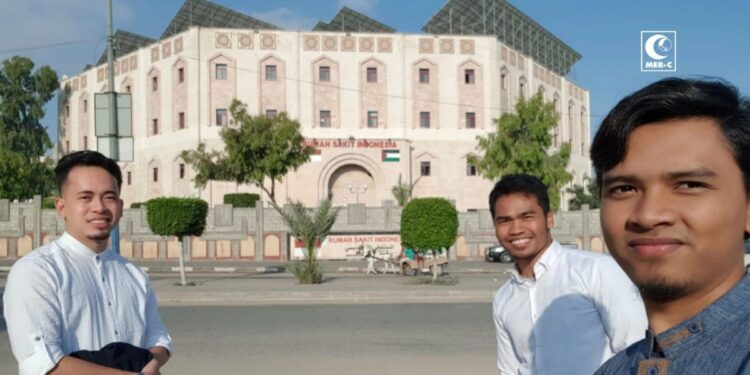Medan, Indonesia – As Israeli tanks and troops besieged the Indonesian hospital in northern Gaza last week, volunteer medical worker Fikri Rofiul Haq had to choose between evacuating to safety or staying with his patients.
Haq and his Indonesian colleagues, Reza Aldilla Kurniawan and Farid Zazabil Al Ayubi, volunteers with the Jakarta-based Emergency Medical Relief Committee (MER-C), chose to stay put until the Israeli army forced them to leave, he said.
“We were evacuated via a route taken by the International Red Cross with the authorization of the Israeli army. There were three evacuations on Monday, Tuesday and Wednesday, and we were evacuated last because we prioritized the injured who were in the Indonesian hospital,” Haq told ManhattanTribune.
Haq said Israeli forces deliberately destroyed the Indonesian-funded hospital’s only working generator by setting it on fire and killed 12 people in indiscriminate shelling on the first, second and third floors of the building.
“Before we were evacuated, the attacks got worse by the hour,” said Haq, who was unable to communicate for several weeks until he was evacuated to Khan Younis.
“I saw it with my own eyes. There were three large tanks about 50 meters (54 yards) from the Indonesian hospital building and they were periodically firing at the hospital, which was devastating. Today, the Indonesian hospital was completely taken over by the Israeli army,” he said.
Israeli forces, who initially gave medical staff and patients only a few hours to leave the hospital, were accused of reducing one of Gaza’s largest medical facilities to rubble in the days before the four-day truce with Hamas, which began Friday.
Gaza’s health ministry said Friday that Israeli gunfire in the final hours before the break killed one woman and injured at least three other people.
ManhattanTribune’s Osama Bin Javaid, who was able to gain access to the facility, reported that there was a “stench of death” outside the hospital “as charred and decomposing bodies, including children, crowding into the corners.”
Sarbini Abdul Murad, director of MER-C in Jakarta, said the attacks on the hospital were a violation of international law and that Indonesia should do more to hold Israel accountable given the country’s ties to the hospital, which was inaugurated in 2016 by Jusuf Kalla, then Indonesian vice-president, after being funded with donations from Indonesian citizens and humanitarian organizations.
However, Jakarta’s influence may be limited. Indonesia does not have diplomatic relations with Israel and the hospital does not belong to Indonesia or the Indonesians since it was donated to the population of Gaza.
“The Indonesian hospital was built with donations from Indonesian citizens and flies the Indonesian flag as a symbol of our friendship,” Sarbini told ManhattanTribune.
“The best we can do at MER-C is to represent the Indonesian people and encourage the Indonesian government and the Ministry of Foreign Affairs to take this case to the International Criminal Court (ICC).”
“Everyone must put pressure on the ICC, especially the big five (the five permanent members of the UN Security Council: China, France, Russia, the United Kingdom and the United States), and call for a permanent ceasefire,” he added.
Sarbini said there were no plans to permanently evacuate the three Indonesian volunteers from Gaza, as they still have important work to do in terms of providing humanitarian assistance to the injured and displaced in Khan Younis.

For now, Haq and his colleagues are taking stock of their situation and figuring out how best to help the people of Gaza.
He said they are well nourished after surviving for days on dwindling food and water rations at the besieged Indonesian hospital.
“Thank God we have enough food here now and there are people selling supplies around the European Hospital in Khan Younis,” Haq said.
“We eat fries, fried eggplant and fried peppers. Sometimes we can get rice with a little meat, and sometimes we eat local foods like bread and hummus.



